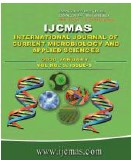


 National Academy of Agricultural Sciences (NAAS)
National Academy of Agricultural Sciences (NAAS)

|
PRINT ISSN : 2319-7692
Online ISSN : 2319-7706 Issues : 12 per year Publisher : Excellent Publishers Email : editorijcmas@gmail.com / submit@ijcmas.com Editor-in-chief: Dr.M.Prakash Index Copernicus ICV 2018: 95.39 NAAS RATING 2020: 5.38 |
Wheat is a major cereal crop of the world and one third of the world's population uses it as a staple food. However, with the changing climatic scenario and prevalence of higher temperatures, heat stress has become a major factor limiting productivity. Hence, the present study was conducted with the objective to develop suitable mitigation strategy to counter the adverse effect of heat stress. The field experiment was conducted during rabi2017-18 and rabi 2018-19 in the Division of Seed Science and Technology, ICAR - Indian Agricultural Research Institute (IARI), New Delhi, India. Seven representative varieties from different zones were used for the present study. The Laboratory studies were conducted in the Division of Seed Science and Technology and Division of Genetics, ICAR-IARI, New Delhi. Heat stress was found to have a significant influence on the seed quality parameters. Germination and vigour Index, I reduced significantly under late sown conditions. Similar trend was observed for VG II. Foliar sprays with different chemicals viz. alpha tocopherol (150ppm), ascorbic acid (10ppm) + citric acid (1.3%), KCl 1%, Brassinolides (0.1ppm) and salicylic acid (200ppm) were carried out at vegetative (booting stage) and seed filling stage. Seed harvested from heat stressed environment showed a significant increase in morphological and seed quality parameters when sprayed with various foliar sprays. The result also shows that foliar spray of salicylic acid @ 200ppm and KCl 1% is effective in increasing various morphological parameter like number of seed per spike, thousand seed weight and seed quality parameter of seed. The seed germination and VG I and II were also showing increasing trends. Salicylic acid interacts with proline metabolism and ethylene formation to alleviate the adverse effects of heat stress on photosynthesis in wheat. Application of KCl results in higher potassium content, increases soluble sugar and proline content in leaf and potentials in maintaining longer green area duration with higher leaf chlorophyll that ultimately contribute to yield and quality of wheat grain and thereby might contribute to heat tolerance. Hence, all foliar sprays could successfully mitigate the effect of heat stress, however, salicylic acid @ 200ppm and KCl 1%was found to be the most effective.
 |
 |
 |
 |
 |